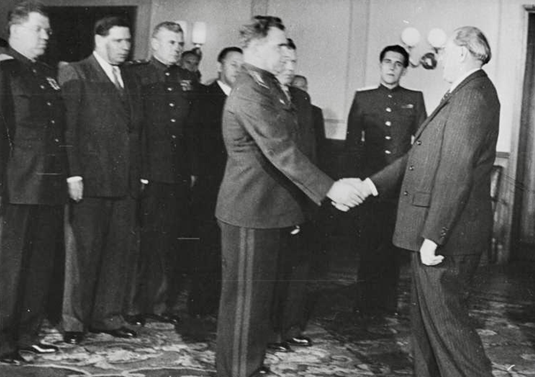When the Germans Invaded the Soviet Union in 1941…
- Maria A. Kithcart

- Jun 22, 2022
- 3 min read

Pictured from left to right: adviser N.T. Fedorenko, military attaché N. V. Roshchin (Ruzankov), plenipotentiary A. S. Panyushkin, chief military adviser Karpov (Lieutenant General V. I. Chuikov), representative of the Comintern P. P. Vladimirov (Vlasov), Marshal Chiang Kai-shek, unidentified persons. 1942.
On 22 June 1941 at 4 AM, three million Axis forces—Germany and her allies—invaded the Soviet Union along the vast border. The Molotov-Ribbentrop Treaty was signed in August 1939 with the intent of delaying, if not preventing, an invasion of Germany into the Soviet Union. However, Hitler was infamous for breaking promises. During the months prior to the invasion, Axis forces were being transferred to the Eastern Front to build up along the Soviet Western boundary. Codenamed Operation Barbarossa, the Germans caught the Red Army by surprise.
In the summer of 1941, Marshal Chuikov was still serving as Soviet military attaché to Chiang Kai-Shek in China. Chuikov’s work in the Far East was important to the defense of the Soviet Union. His task was to advise and assess Chinese forces’ readiness; moreover, he served to encourage Chiang Kai-Shek and his Kuomintang (KMT) armies to unite with Mao Zedong’s Chinese Communist Party (CCP) forces against the Imperial Japanese forces and to prevent civil war. It is claimed that WW2 actually began when the Japanese invaded China in 1937, instead of the 1 September 1939 date of the German invasion of Poland. To avoid a two-front war, the Soviet Union needed to protect its eastern border from direct conflict with Japan. When the Soviets were assured that Japan did not plan to attack, Red Army troops were diverted from the Far East and sent to the West.
Vasily Ivanovich wrote that once the invasion occurred, he requested on more than one occasion to be sent to the battlefront in the Soviet West. Eventually, his wish was granted. He was recalled to Moscow to provide a report of the activities in China. When Chuikov was recalled home at the beginning of 1942, he knew in his heart that he would never return to China.
In reflection of Marshal Chuikov’s personal experience against the backdrop of the Second World War, I pondered a few things. First, he must have felt a heightened sense of frustration of being stationed in the Far East when he was anxious to return to the Soviet Union to do battle with the Germans and their allies. After the 1941 invasion, his family evacuated to Kuibyshev (modern-day Samara), located on the Volga north of Stalingrad. No doubt this weighed heavily on his mind.
Kuibyshev was also the location selected as an alternate capital should Moscow fall into German possession. Today, tourists can visit an underground bunker that would have served as Stalin’s HQ in Samara had he chosen to relocate. However, Stalin decided instead to remain in Moscow and mandated that the citizens and the Red Army stay and defend the city. His decision to stay also helped curb the panic people were experiencing as they rushed to leave.
Next, Vasily Ivanovich knew he had the ability to observe and analyze the enemy to find vulnerable areas and develop a plan of attack. His years of training and experience in the field prepared him well to be an offensive, fighting general. The Germans were a force to be reckoned with—their Blitzkrieg tactics of coordinating their forces to swiftly overwhelm enemy armies often meant that the Germans took thousands of prisoners of war. If a weakness could be exploited, it would mean that the Germans would be rendered ineffective. Chuikov’s talents and abilities proved essential to the Red Army’s success at Stalingrad.
Interestingly enough, right around the time of the Japanese bombing of Pearl Harbor in December 1941, Chuikov traveled from Chongqing to Chengdu to receive medical treatment for an old wound that reopened. Which wound is not specified in his account shared in his book titled Mission to China, for he was wounded four times during the Russian Civil War 20 years earlier. One of those old wounds (in the left arm) resulted in a bullet remaining embedded due to the risk of severing a nerve during surgery. According to Michael Jones, author of Stalingrad: How the Red Army Triumphed, this same wound would later cause complications ending Marshal Chuikov’s life at the age of 82.



